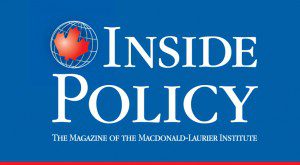 New Conservative leader Andrew Scheer needs to be open to good ideas from his closest competitors, writes Stanley Hartt. But some of the more notorious ideas should be discarded.
New Conservative leader Andrew Scheer needs to be open to good ideas from his closest competitors, writes Stanley Hartt. But some of the more notorious ideas should be discarded.
By Stanley Hartt, Aug. 29, 2017
Bismarck’s famous statement that, “Politics is the art of the possible, the attainable – the art of the next best” was very much in play at the Conservative Party’s leadership selection process. By adopting a preferential ballot to make the selection, they made sure that their new leader would be the first choice of a few and the second, third or fourth choice of many.
Andrew Scheer is a presentable politician. He earned a reputation for good humour and civility during his stint as Speaker of the House of Commons. His French is better than passable, as it would have to be as presiding officer in our elected legislative chamber. He has a tendency to smile, even when discussing extremely polarizing and contentious issues. But, if the Tories were hoping to identify someone who could inspire crowds and lead masses, the man who was the first choice of 21.82 percent of Party members on the first round of voting is not the guy.
For those who did not follow the intricacies of the process, 14 candidates were on the ballot (even though one of them, Kevin O’Leary, had dropped out of the race after the ballots were printed). Voting members were asked to list in numerical order of preference their top ten choices. Each member was associated with an Electoral District Association (“EDA”) – the riding organization which the Party maintains in each of Canada’s 338 constituencies. Votes by Party members were proportioned so that each EDA had 100 votes, in order to ensure regional equity. So an EDA with 10,000 members had 100 votes, and one with 63 members had 100 votes.
It isn’t just that the victory wasn’t stirring. It leaves the public scratching their heads about what the Party actually stands for.
On the first round of voting, Deepak Obhrai came in last with 0.41 percent of the votes. His votes were then re-allocated using the same procedure to the second choices of his supporters. This continued until the 13th round of voting, where, for the first time, Mr. Scheer passed Maxime Bernier, MP from Beauce, Québec, and won 50.95 percent to 49.05 percent of the weighted points.
It isn’t just that the victory wasn’t stirring. It leaves the public scratching their heads about what the Party actually stands for. The Leader is not free to set policy based on his successful campaign. The Party requires policy development conferences at the membership level to submit policy proposals for voting and vetting by EDA, regional, provincial and ultimately national policy committees, and are only enshrined in a potential platform by resolutions adopted at a national convention.
As Thomas Jefferson said, “Democracy is cumbersome, slow and inefficient, but in due time, the voice of the people will be heard and their latent wisdom will prevail.” In the meantime, how are the best ideas from the various platforms of the leadership candidates to be retained, developed and refined so that some of the strong views expressed during the campaign are not lost as “sound and fury, signifying nothing”?
Candidates often spoke from conviction about potential legislative initiatives they would press if elected, and many of the ideas were sound, creative, thoughtful, and helpful. Despite some observers writing off the leadership race on the basis that all Tories more or less stood for the same thing, there were a multitude of areas where this was not so. Sometimes a candidate went out of their way to espouse a policy plank that seemed outrageous to the others and to the media, just to be distinguished from the pack. But it was often the case that excellent proposals came from losing candidates, including some who lost badly.
Now, it will not surprise the reader to learn that sometimes victorious candidates shun the ideas of their closest competitors. They may even relegate opponents to minor positions in assigning critic roles or committee memberships or when determining the general prominence of Party up-and-comers. Every Party does this. Even MPs sitting in the current Liberal Cabinet got there because they were not, in their view, accorded the standing they deserved when they began their political careers in the Conservative Party.
The new Conservative Leader would be wise if he immediately discarded some of the most notorious, unhelpful views that emerged during the leadership contest. Kellie Leitch attempted to grab attention by suggesting that every foreign applicant to Canada should have a face to face interview with a Canadian government representative – to ensure that the applicant shared “Canadian values.” This concept could have been intended to mean inclusiveness, generosity, support for our medical care system, social programs, etc. But it was purposely allowed to fester as an unspoken reference to “barbaric cultural practices,” such as honour killings and female genital mutilation.
The new Conservative Leader would be wise if he immediately discarded some of the most notorious, unhelpful views that emerged during the leadership contest.
This is not surprising. This was the same candidate who set up a “snitch line” during the last election campaign, resulting in significant voter outrage. Then Ms. Leitch came out with the idea that Canada needed to be governed by more plebiscites, referenda, and popular initiatives to “let the people speak,” an idea far more suited to the system of government south of the border but anathema in our Parliamentary representative democracy. Responsible government operates through the principle that the executive must at all times retain the confidence of the legislature, failing which we get an election to select a government that will enjoy such confidence.
Other ideas suitable for the trash bin would include Steven Blaney’s resurrection of the ill-fated Harper-era ban on wearing the Niqab by public servants or when voting or swearing the oath of allegiance at citizenship ceremonies. Apart from any view on its substantive merits, this idea was in large measure responsible for giving Justin Trudeau his majority. It was Tom Mulcair, after all, who when forced to choose between the anti-clericalism of his Quebec base, which would have supported the ban, and the soft-hearted, inclusiveness of the Anglophone-majority provinces, broke the “anybody but Harper” tie with the Liberals by opposing the ban.
Michael Chong’s carbon tax should not be far behind for Conservatives. Nor should Pierre Lemieux’ pre-occupation with re-opening lost social conservative battles on abortion and same-sex marriage. Brad Trost had proposed a Trump-like ban on entry to Canada from countries or regions that harbour, support, or encourage terrorism and extremism, and it would be easy to forecast how long such a broad-brush approach to border security would survive a test in the Supreme Court of Canada.
But what of the good ideas proposed by Mr. Scheer’s rivals? There seemed to be a consensus for lower taxes, smaller government, and fiscal responsibility, and the new Leader will doubtless build the next electoral platform around such basic conservative values. But is there a risk that bolder, imaginative and growth-oriented initiatives fall by the wayside merely because they originated with campaign rivals, particularly those who came close to claiming the prize?
Maxime Bernier’s platform was based on rock-solid economics. From completely ending all barriers to interprovincial trade, to pursuing new international trade agreements (including, presumably, retaining some form of the Trans-Pacific Partnership [“TPP”], despite the US decision to withdraw), to eliminating corporate welfare and ending the plethora of boutique tax credits, Bernier’s policies were an economic purist’s delight.
He was also a strong proponent of privatizing Crown assets that were an impediment to creative market competition, such as the mortgage insurance and securitization functions of the Canada Mortgage and Housing Corporation, as well as Canada Post and our airports while also eliminating the power of the CRTC (Canadian Radio-television and Telecommunications Commission) to constrain competition in broadcasting.
Maxime Bernier’s platform was based on rock-solid economics.
But the natural impediment to all growth-oriented policies is that good economics do not always lead to attractive political positions. Once a program is in place, it invariably has a following who adore and defend it. The mantra in the Finance Department when I served there was always, “The easiest policy to cut is one that hasn’t been announced yet.” An economics professor of mine, David McCord Wright, used to put it even more simply: “Growth comes through change and causes change.”
This is the bane of Conservatives. The Liberal practice of transferring resources through government spending to “needy” individuals and groups is easier to understand than the Conservative view that better results are obtained by creating an environment for investment, risk-taking and job-creation by reducing the size of government and the tax burden, controlling inflation, and limiting red tape and regulation. It takes a very good and committed communicator, like Mike Harris, for example, to get citizens to buy into that logic.
It might, of course, be even more politically problematic to espouse Mr. Bernier’s promise to eliminate marketing boards for dairy and poultry products. But the potential results might well be worth the painful adjustments that all institutional disruption inevitably causes. When the Canadian Wheat Board was eliminated, a number of significant new grain industry traders and processors emerged to give farmers real choice and to modernize our market. At the time of the original Canada-US Free Trade Agreement, we had identified industries that we were certain would effectively disappear, among them the wine industry. What happened instead was that, with the entire North American continent as their market, the best Canadian winemakers grew exponentially. Smaller, craft wineries of very high quality emerged, and we now can hold our heads up as among the world’s leading wine producers.
Our marketing boards have already escaped one round of trade negotiations in which there was some risk of their demise. New Zealand and Australia had made it a condition of our entry into the TPP negotiations that we be willing to have these “on the table.” We escaped with only a readjustment of the quotas, largely because distance meant that few New Zealand or Australian dairy producers saw Canada as a practical market for their products in any mass volume. But, with NAFTA up for renegotiation, we should turn our attention to thinking about the economic gains to be achieved by restructuring these basic food-producing industries while massively lowering the costs to consumers of dairy and poultry products. New co-operatives, like Agropur, could emerge providing ownership interests and employment to the owners of small farms dedicated to those product lines and, with proper adjustment programs, the resulting growth would increase our prosperity and standard of living .
Don’t write these ideas off too quickly. They are sound, overdue and in the country’s best interest. Over to you Mr. Scheer! Make these truly Conservative policies yours and the Party’s. Selling them will be the legitimate test of your leadership skills!
Stanley Herbert Hartt, OC, QC is a lawyer, lecturer, businessman, and civil servant. He currently serves as counsel at Norton Rose Fulbright Canada. Previously Mr. Hartt was chairman of Macquarie Capital Markets Canada Ltd. Before this he practised law as a partner for 20 years at a leading Canadian business law firm and was chairman of Citigroup Global Markets Canada and its predecessor Salomon Smith Barney Canada. Mr. Hartt also served as chairman, president and CEO of Campeau Corporation, deputy minister at the Department of Finance and, in the late 1980s, as chief of staff in the Office of the Prime Minister.





